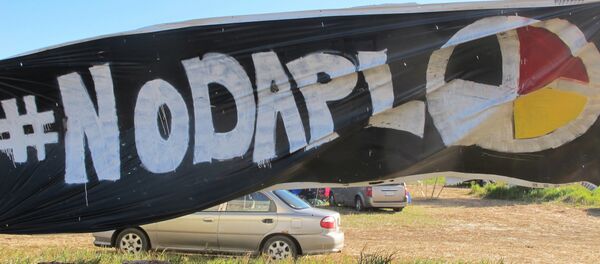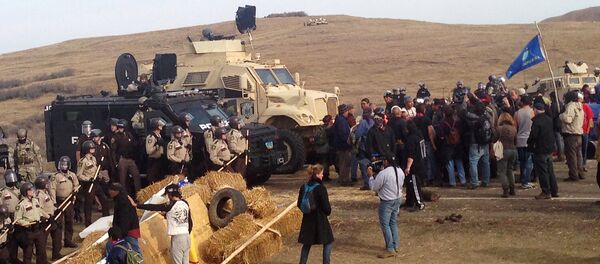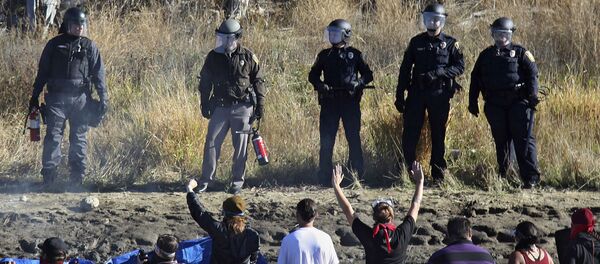Tribe members and thousands of supporters have set up camp just outside the Standing Rock Sioux reservation to support the tribe's protest against the controversial Dakota Access Pipeline (DAPL).
The letter to the tribe was delivered the day after the US Thanksgiving holiday, an additional insult, tribal leaders say.
John W. Henderson, a district commander with the Army Corps of Engineers, wrote to the tribe, "I am closing the portion of the Corps-managed federal property north of the Cannonball River to all public use and access effective December 5, 2016."
— Josh Fox (@joshfoxfilm) November 25, 2016
The decision was needed "to protect the general public from the violent confrontations between protesters and law enforcement officials that have occurred in this area, and to prevent death, illness, or serious injury to inhabitants of encampments due to the harsh North Dakota winter conditions."
In the past week, police reactions to protesters have become more violent, with police turning hoses on protesters in below freezing temperatures, firing rubber bullets and using tear gas. The police consistently describe those opposing the pipeline as "rioters;" in an incident November 21 that sent more than a dozen protesters to the hospital, protesters said they were simply trying to remove barricades on a road that prevented emergency services from reaching them.
Henderson said, however, that a "free speech zone" would be set up south of the Cannonball River.
"I do not take this action lightly, but have decided that it is required due to the concern for public safety and the fact that much of this land is leased to private persons for grazing and/or haying purposes as part of the Corps' land management practices. To be clear, this means that no member of the general public, to include Dakota Access pipeline protesters, can be on these Corps' lands."
Chairman of the Standing Rock Sioux Dave Archambault II said the the tribe is "deeply disappointed" but resolved to continue to protect the tribe's water, which they feel the pipeline threatens.
"Our Tribe is deeply disappointed in this decision by the United States, but our resolve to protect our water is stronger than ever. We ask that all everyone who can appeal to President Obama and the Army Corps of Engineers to consider the future of our people and rescind all permits and deny the easement to cross the Missouri River just north of our Reservation and straight through our treaty lands."
Archambault also noted that the tribe has opposed the pipeline route since it was proposed to them years ago. "When Dakota Access Pipeline chose this route, they did not consider our strong opposition," he wrote. The tribe has released audio recordings from a meeing in 2014 that they say demonstrate their clear concern and opposition.
The decision to evict the protesters is "saddening," but not at all surprising, "given the last 500 years of the treatment of our people," Archambault wrote.
In a press conference November 26, organizers said 1,500 US veterans were still planning to come to the camp to stand with the protesters. Standing Rock Sioux representatives noted that some accommodations would be made in light of safety and the coming deadly freezing temperatures of winter in the Dakotas, but that the tribe would only move for those considerations, on their own terms. "We are staying here committed to our prayer," they said.
Dallas Goldtooth, an organizer with the Indigenous Environmental Network, told the Bismark Tribune that there is no way there is space south of the river for the 5,000 to 7,000 people he estimates to be living at the protest camp.
"There's no other space that can take people right now. This is a stupid, foolish act by the corps. I'm fairly sure that law enforcement would be just as concerned," Goldtooth said.
Opponents of the $3.8 billion dollar pipeline project say the route threatens the reservation's drinking water and will encroach on sacred sites. An early route considered for the pipeline was considered too dangerous in part because of its proximity to the water supplies of the city of Bismark. Pipeline developer Energy Transfer Partners says the 1,200-mile, four-state pipeline will be safe.
The leader of the Cheyenne River Sioux in South Dakota has called those opposed to the pipeline to boycott businesses in North Dakota's capital, Bismarck, and the neighboring city of Mandan on November 22.
"These communities have led the violent law enforcement efforts against out people and we will not support them financially," he wrote. "I look forward to your cooperation in this effort and I call on all people who oppose violence against unarmed and peaceful citizens to #BoycottBismarck."






